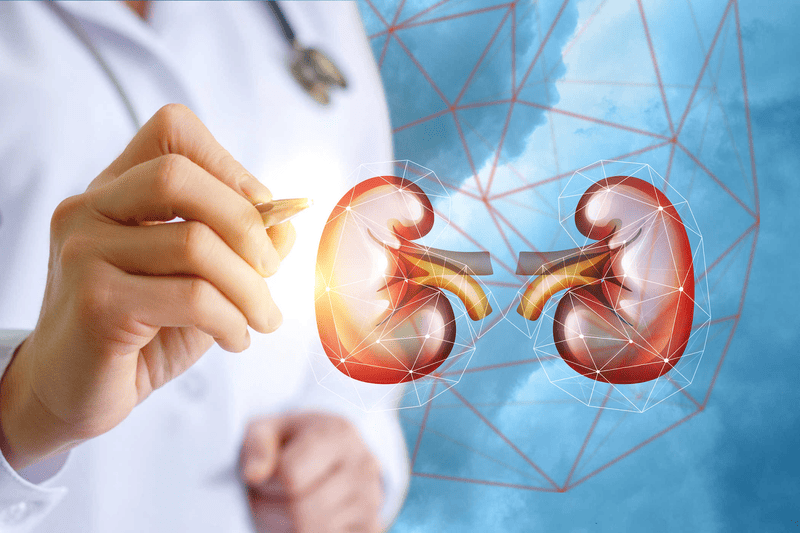What Is The Connection Between Hypertension And Hormonal Imbalances?

Hypertension, also known as high blood pressure, is a prevalent health condition affecting a significant portion of the global population. While the causes of hypertension are multifactorial, recent research has indicated a potential link between hormonal imbalances and the development of high blood pressure.
This article aims to explore the connection between hypertension and hormonal imbalances, shedding light on the role of various hormones in blood pressure regulation. Specifically, the impact of estrogen, progesterone, testosterone, thyroid hormones, and cortisol will be investigated, as these hormones have been implicated in the modulation of blood pressure levels.
By understanding the intricate relationship between hormonal imbalances and hypertension, it may be possible to identify novel therapeutic strategies and lifestyle modifications that can help manage this condition. Through an academic lens, this article will provide an objective and impersonal analysis of the existing literature on the topic, with the aim of contributing to the broader understanding of hypertension and its potential hormonal drivers.
Key Takeaways
- Hormonal imbalances disrupt blood pressure regulation and can lead to hypertension.
- Excessive aldosterone production and overactive thyroid gland are examples of hormonal imbalances that can increase blood pressure.
- Hormonal imbalances can also impact blood vessel function and increase the risk of atherosclerosis.
- Managing hypertension requires addressing underlying hormonal conditions and maintaining hormonal balance through lifestyle changes such as exercise, healthy diet, stress reduction, and adequate sleep.
Understanding Hypertension and its Causes
Hypertension, also known as high blood pressure, can be caused by various factors including hormonal imbalances. Hormones play a crucial role in regulating blood pressure by controlling the constriction and relaxation of blood vessels.
When there is an imbalance in hormone levels, especially those involved in the renin-angiotensin-aldosterone system, it can lead to increased vasoconstriction and fluid retention, ultimately resulting in hypertension. Other hormonal imbalances, such as an overactive thyroid or an excess of cortisol due to stress, can also contribute to elevated blood pressure.
It is important to note that while hormonal imbalances can be a contributing factor, they are not the sole cause of hypertension. Other lifestyle factors, such as obesity, poor diet, lack of physical activity, and smoking, also play a significant role.
Therefore, hypertension prevention strategies should focus on addressing these various factors to effectively manage blood pressure levels.
Exploring the Role of Hormones in Blood Pressure Regulation
By examining the intricate interplay of various hormones involved in the regulation of blood pressure, a deeper understanding of the physiological mechanisms underlying hypertension can be achieved. Hormones play a crucial role in blood pressure control, and any imbalances in their levels or functioning can lead to hypertension. The renin-angiotensin-aldosterone system (RAAS), for instance, is a hormonal pathway that regulates blood volume and systemic vascular resistance. Imbalances in this system, such as increased production of renin or aldosterone, can result in elevated blood pressure. Similarly, hormonal imbalances involving the sympathetic nervous system, vasopressin, and endothelin can also contribute to hypertension.
To better illustrate the complexity of hormonal involvement in blood pressure regulation, a table can be created:
| Hormone | Function in Blood Pressure Regulation |
|---|---|
| Renin | Initiates the RAAS pathway |
| Angiotensin II | Increases vasoconstriction |
| Aldosterone | Increases sodium reabsorption |
| Sympathetic Nervous System | Increases heart rate and vasoconstriction |
| Vasopressin | Increases water reabsorption |
| Endothelin | Increases vasoconstriction |
Understanding the role of hormones in hypertension is crucial for developing targeted treatment strategies to regulate blood pressure and prevent associated complications. By addressing hormonal imbalances, healthcare professionals can intervene in the complex web of physiological processes contributing to hypertension.
The Impact of Estrogen and Progesterone on Hypertension
Estrogen and progesterone, two key female sex hormones, have been found to play a significant role in the regulation of blood pressure. The impact of hormonal contraceptives on blood pressure has been extensively studied. It has been observed that some hormonal contraceptives, particularly those containing estrogen, can lead to an increase in blood pressure in certain individuals. This increase is more pronounced in women who already have hypertension or are prone to developing it.
On the other hand, the effects of menopause on hypertension are complex. The decline in estrogen levels during menopause is thought to contribute to an increase in blood pressure. However, the relationship between menopause and hypertension is not fully understood and further research is needed to establish a clear link.
Understanding the impact of estrogen and progesterone on blood pressure regulation is crucial in managing hypertension in women and developing targeted interventions.
The Influence of Testosterone on Blood Pressure Levels
Testosterone, a hormone primarily associated with male physiology, has been found to have an impact on blood pressure levels. Studies have shown that testosterone plays a role in regulating blood pressure, although the exact mechanisms are not yet fully understood.
One possible explanation is that testosterone affects the production and activity of other hormones involved in blood pressure regulation, such as aldosterone. Aldosterone, a hormone produced by the adrenal glands, is known to increase sodium reabsorption and potassium excretion in the kidneys, leading to increased blood volume and higher blood pressure. Testosterone may influence the production and release of aldosterone, thereby affecting blood pressure levels.
Additionally, testosterone has been found to have direct effects on blood vessels, promoting vasoconstriction and potentially contributing to hypertension.
Further research is needed to fully elucidate the relationship between testosterone, hormonal imbalances, and hypertension.
Thyroid Hormones and their Relationship to High Blood Pressure
Thyroid hormones, crucial regulators of metabolism and growth, have been found to have a potential relationship with high blood pressure, providing insight into the complex interplay between endocrine function and cardiovascular health. Research suggests that both hyperthyroidism (excessive thyroid hormone production) and hypothyroidism (insufficient thyroid hormone production) can contribute to the development of hypertension. Hyperthyroidism is associated with increased cardiac output and peripheral vascular resistance, leading to elevated blood pressure. On the other hand, hypothyroidism can cause fluid retention and decreased peripheral vascular resistance, also resulting in high blood pressure. The precise mechanisms by which thyroid hormone imbalances affect blood pressure regulation are not fully understood, but they likely involve alterations in vascular tone, sodium and water balance, and sympathetic nervous system activity. Understanding the relationship between thyroid hormones and hypertension is essential for optimizing the management and treatment of both conditions.
| Thyroid Hormones and Hypertension | Thyroid Hormone Imbalance and Blood Pressure |
|---|---|
| Hyperthyroidism | Increased cardiac output and peripheral vascular resistance |
| Hypothyroidism | Fluid retention and decreased peripheral vascular resistance |
| Mechanisms not fully understood | Alterations in vascular tone, sodium and water balance, and sympathetic nervous system activity |
Cortisol and Stress: How Hormonal Imbalances Contribute to Hypertension
Cortisol, a hormone released in response to stress, plays a role in the development of hypertension through its influence on vascular tone, sodium and water balance, and sympathetic nervous system activity.
- Cortisol and weight gain: Chronic stress can lead to sustained high levels of cortisol, which can contribute to weight gain and obesity. Excess body weight is a known risk factor for hypertension.
- Cortisol and immune system: Prolonged exposure to cortisol can suppress the immune system, increasing susceptibility to infections and inflammation. Inflammation, in turn, can contribute to the development and progression of hypertension.
- Cortisol and vascular tone: Elevated cortisol levels can lead to increased vascular tone, causing blood vessels to constrict and raising blood pressure.
- Cortisol and sympathetic nervous system activity: Cortisol stimulates the release of catecholamines, such as adrenaline, which can increase heart rate and constrict blood vessels, further elevating blood pressure.
Understanding the connection between cortisol and hypertension is crucial for developing targeted interventions to mitigate the impact of hormonal imbalances on blood pressure regulation.
Hormonal Imbalances and Secondary Hypertension
Continuing the discussion on the relationship between hormonal imbalances and hypertension, the current subtopic focuses on hormonal imbalances and secondary hypertension. However, it is important to acknowledge the role of hormonal imbalances in primary hypertension as well.
Hormonal imbalances can disrupt the delicate balance of hormones involved in regulating blood pressure, leading to an increase in blood pressure levels. This can occur due to various factors, such as excessive production of aldosterone, a hormone that regulates sodium and potassium levels, or an overactive thyroid gland.
Additionally, hormonal imbalances can also impact cardiovascular health by affecting blood vessel function and increasing the risk of atherosclerosis. Understanding the intricate connection between hormonal imbalances and primary hypertension is crucial for developing effective treatment strategies and mitigating the adverse effects on cardiovascular health.
Managing Hypertension through Hormonal Balance and Lifestyle Changes
Managing hypertension requires a holistic approach that includes maintaining hormonal balance and implementing lifestyle changes to effectively combat the detrimental effects on cardiovascular health.
Hormonal imbalances play a significant role in the development and progression of hypertension. For instance, a decrease in estrogen levels during menopause has been associated with an increased risk of developing high blood pressure in women. Additionally, conditions such as hyperthyroidism and Cushing’s syndrome, which involve hormonal imbalances, can also contribute to elevated blood pressure levels.
Therefore, managing hypertension through hormonal balance involves addressing these underlying hormonal conditions.
Furthermore, lifestyle modifications such as regular exercise, a healthy diet, stress reduction techniques, and adequate sleep can help regulate hormone levels and lower blood pressure. These lifestyle changes promote overall cardiovascular health and assist in maintaining hormonal balance, thus effectively managing hypertension.
Frequently Asked Questions
How can hormonal imbalances lead to hypertension?
Hormonal imbalances may contribute to the development of hypertension through various mechanisms. Dysregulation of hormones such as aldosterone, renin, and cortisol can lead to increased blood pressure, sodium and water retention, and vascular dysfunction. Further research is needed to establish a causal relationship.
Can hormonal imbalances be the primary cause of hypertension?
Hormonal imbalances can play a significant role in the development of hypertension, but they are not always the primary cause. The relationship between hormonal imbalances and hypertension is complex, and further research is needed to fully understand this connection.
Which specific hormones are most commonly associated with hypertension?
The role of stress hormones, such as cortisol and adrenaline, in hypertension has been well-established. Additionally, thyroid hormones have been found to impact blood pressure regulation, with hypothyroidism often associated with increased blood pressure.
Are there any natural remedies or lifestyle changes that can help regulate hormones and lower blood pressure?
Natural remedies for hormonal imbalances include herbal supplements, such as chasteberry and black cohosh, as well as lifestyle changes like regular exercise and stress management. These remedies may also help lower blood pressure in individuals with hypertension.
Is hormonal imbalance-induced hypertension reversible with proper treatment?
Hypertension induced by hormonal imbalances can be reversible with appropriate treatment. Effective interventions focusing on the underlying hormonal causes of hypertension can help regulate blood pressure and restore balance in the body.









